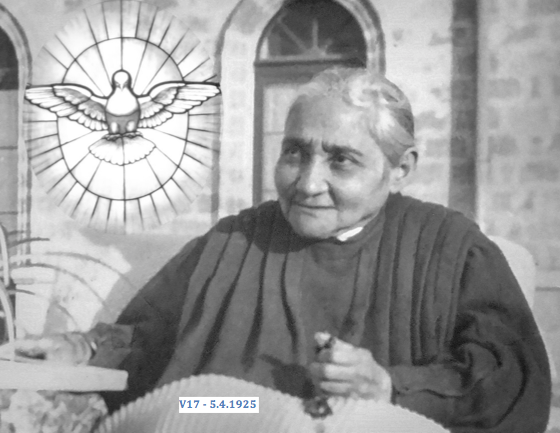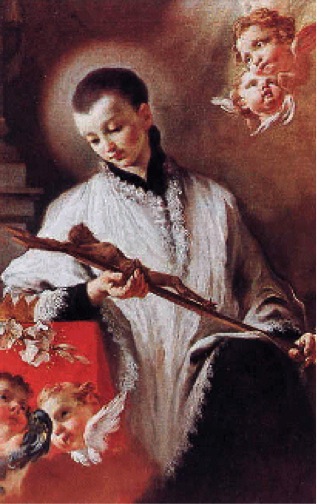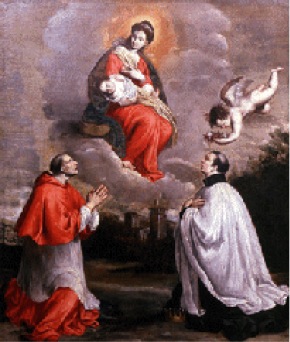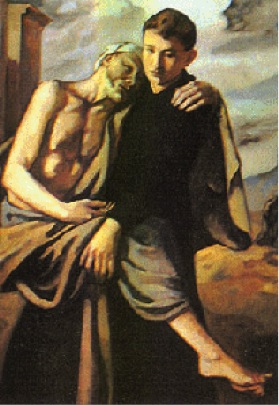“I am but a crooked piece of iron, and have come into religion to be made straight by the hammer of mortification and penance.” St. Aloysius Gonzaga
|
Aloysius makes a timeless example for our youth; he faced the same kinds of challenges they do today such as: peer pressure, struggles with remaining pure, and difficulties in choosing and pursuing a vocation. Despite being among very rough and impure people, and despite many arguments from his parents, Saint Aloysius maintained a pure heart, and became a Jesuit priest. |
| PRAYERS |
|
Aloysius, You have drawn me to you, gentle teacher, loving guide. I am filled with gratitude to you…I love you. Just to see you, to sit with your image, is to see all the innocence, the trust, and the fire of prayer of the children of the kingdom. Aloysius, Let me serve, let me love as you loved people on earth. Teach me to leave the dark destructive forces within and without for the Light in the presence of Our Savior, Jesus. Aloysius, Teach me to pray unceasingly, pray with me, stay near me, kneel with me…take my hand. And finally when my life here is over, come to lead me Home. Amen On the Medal: On the Single Bead (white/clear – for his innocence): On the 23 Beads (blue – for his devotion to Mary): Closing Prayer: |
| Marian Prayer of St. Aloysius Gonzaga |
|
|
Four Devotions |
Aloysius had four special devotions:The first of these was his devotion to the Blessed Sacrament. He divided the week into two parts, the first of which he devoted in thanksgiving for his last Holy Communion, and the second in preparation for the next Holy Communion. The second devotion was to the Passion of Our Lord. The life of suffering and mortification Aloysius led naturally urged him to seek in the mysteries of the Passion a model of strength and comfort. The third devotion was his ardent love of Our Lady — he never tired of thinking of her. She had been the queen of his heart and the guiding star of his life. Lastly his devotion to the Angels was very special, in fact the only major writings he ever wrote were on the Holy Guardian Angels and the nine choirs of Angels. |
| Litany of Saint Aloysius |
|
This litany comes from an old prayer book long out of print; the concluding prayer as give here is from the recent and admirable Saint Andrew Daily Missal. Lord, have mercy on us. God, the Father of heaven, Holy Mary, Pray for us. Be merciful: From the concupiscence of the eyes: Lamb of God, Who takest away the sins of the world: Christ, hear us. Let us pray. O God, Who, in distributing Thy heavenly gifts, didst in the angelic youth Aloysius, unite wonderful innocence of life with an equal spirit of penance: grant through his merits and prayers that we, who have not followed him in his innocence, may imitate him in his penance. Through our Lord Jesus Christ. R.Amen. Prayer Source: Kyrie Eleison — Two Hundred Litanies by Benjamin Francis Musser O.F.M., The Magnificat Press, 1944 |
| HISTORY |
| St. Aloysius Gonzaga’s outstanding quality was his radiant purity and the Church praises this perfect innocence with the words, “Thou has made him little less than the angels.” He was baptized in the womb, because his life was in danger, and he made a vow of chastity at the age of nine. When he was sixteen he joined the Society of Jesus and died at the age of twenty-three in 1591 as a result of his devoted nursing of the plague-stricken.
The time and place where he grew up — 16th-century Italy — is not very different from 21st century America. It was a lax, morally careless, self-indulgent age. Aloysius saw the decadence around him and vowed not to be part of it. He did not, however, become a kill-joy. Like any teenage boy, he wanted to have a good time, and as a member of an aristocratic family he had plenty of opportunities for amusement. He enjoyed horse races, banquets and the elaborate parties held in palace gardens. But if Aloysius found himself at a social function that took a turn to the lascivious, he left. Aloysius did not just want to be good, he wanted to be holy; and on this point he could be tough and uncompromising. He came by these qualities naturally: among the great families of Renaissance Italy, the Medici were famous as patrons of the arts, and the Borgias as schemers, but the Gonzagas were a warrior clan. While most Gonzaga men aspired to conquer others, Aloysius was determined to conquer himself.
Bellarmine put a stop to Aloysius’ boot camp approach to sanctity, commanding him to follow the Jesuit rule of regular hours of prayer and simple acts of self-control and self-denial. Aloysius thought the Jesuits were too lenient, but he obeyed. Such over-the-top zeal may have exasperated Bellarmine, but he believed that Aloysius’ fervor was genuine and that with proper guidance the boy might be a saint. To his credit, Aloysius recognized that his bullheadedness was a problem. From the novitiate he wrote to his brother, “I am a piece of twisted iron. I entered the religious life to get twisted straight.”
In the sick, the helpless, the dying, St. Aloysius saw the crucified Christ. The man of the iron will who thought he could take Heaven by sheer determination surrendered at last to divine grace. — Saints for Every Occasion, Thomas J. Craughwell Patron: AIDS care-givers; AIDS patients; Catholic youth; Jesuit students; relief from pestilence; sore eyes; teenage children; teenagers; young people; youth. Symbols: cross or crucifix; lilies; crown at his feet; rosary; |
|
Saint Aloysius of Gonzaga, born on the 9th of March, 1568 as Luigi Gonzaga, was the eldest son of Ferrante, the Marquis of Castiglione, an Italian nobleman. Even as a child Saint Aloysius was given to prayer and as legend has it that his first spoken words were the Holy Names of Mary and Jesus. Aloysius was the oldest son, raised in the castle Castiglione delle Stivieri in Lombardy, with many servants and plenty of wealth and comfort. Aloysius was a bright and cheerful boy who worked well with others. His father had great hopes that he would embark on a military career and replace him in the nobility with title and property. Aloysius was trained for soldiery and court life from a very young age but was also deeply faithful and pious. The hand of God would not allow him to become a soldier. By age 9 he had privately decided on a religious life, and made a vow of perpetual virginity. He practiced many devotions and mortifications, and safeguarded himself at all times from possible temptation. He had many friends among the soldiers and in the court who pressured him into joining them for their parties and celebrations. Despite all their pressure, Aloysius preferred to spend his free time in prayer, kneeling on a cold stone floor or in church in front of the Blessed Sacrament. His friends and other students, even his parents teased him for this piety and devotion. In 1577, his father took Aloysius (Luigi) and his brother to Florence to study and improve their Latin and Italian. As it would happen, the young man would develop an affinity for study of the saints even more than his regular studies. At this time Aloysius read of the Jesuit missionaries in India, and resolved to join the Society of Jesus. He began by instructing the poor boys of Castiglione in the catechism. At Casal-Monferrato, where he spent winters, he assumed the discipline of a monk, fasting three days a week, scourging himself, and praying at midnight on the stone floor of his unheated room. Over the next two years, Aloysius would fight with his father, mother, royalty, and delegates over his impending Jesuit vocation. At age 12 he encountered the great ecclesiastic, Saint Charles Borromeo, and received his first Holy Communion from him. When Aloysius was in his teens, nearly old enough to begin working as a soldier, he became sick with kidney disease, so sick that he had to stay in bed. He wasn’t sorry though, even though anyone would prefer running and playing to being sick in bed for months and months. Aloysius said he was glad that he was ill, because it gave him more time to pray and meditate. He also used this time to instruct others in their catechism. His father and mother were disappointed that Aloysius was sick, but they were even more disappointed when he said that he wanted to become a Jesuit instead of inheriting his father’s title and estate. He signed over all his inheritance to his younger brother. His parents, teachers and friends argued with him about this decision for three years. His parents continued to disagree with his choice to follow a religious life, as it had been his whole life, on the grounds he should follow in his father’s stead. They relented after most of the family title and responsibilities fell to his younger brother Rudolpho, thus allowing Aloysius to enter his novitiate in November 1585. Aloysius’ health was so poor that he received Holy Viaticum and Extreme Unction on several occasions. Even though Aloysius was still ill from his kidney disease, he insisted on being allowed to assist with the sick and served in a hospital during the plague of 1587 in Milan, during which he fell victim to the dreaded disease himself and died at the age of 23, after having received the last rites from Saint Robert Bellarmine, who later wrote his biography, “Life of Saint Aloysius”. It was revealed to him that he would pass on the Octave of Corpus Christi, and though he appeared much better in the days preceding the Feast, Saint Aloysius Gonzaga did in fact die on the Octave of Corpus Christi, June 21st, 1591. This young man, patron to all young people, was beatified in 1621, and declared a saint in 1725. Aloysius’ relics are buried under the altar of Saint Ignatius Church, Rome. Feast Day: June 21 |
| A lecture on St. Aloysius Gonzaga – Jesuit Saint by Fr. John A. Hardon, S.J. |



